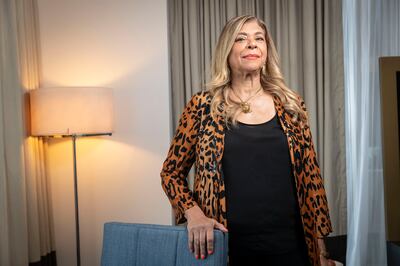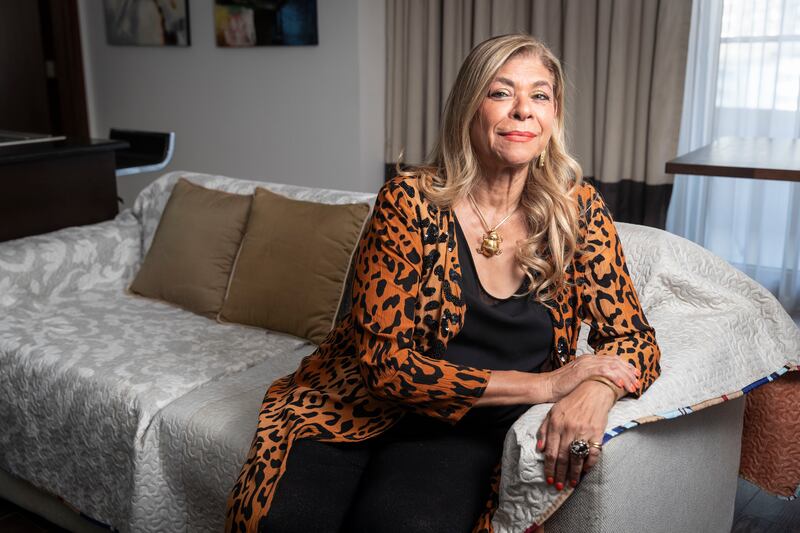Ramona Da Gama is a business growth strategy coach, mentor and motivational speaker who once ran a London jazz club and media sales consultancy.
Now aged 64 and splitting her time between the UAE and France, she helps SMEs to accelerate their growth, entrepreneurs move from employment to starting businesses, and corporations increase their value through sustainability, employee engagement initiatives and change management.
Ms Da Gama grew up in Kenya, where she played table tennis at national level, and was instrumental in large organisation business strategies, including working with Sir Stelios Haji-Ioannou to launch budget airline easyJet.
A widow, she moved to Dubai Sports City last year having first visited the city in 2004 for a branding workshop, then annually for the Middle East Investor Relations Association conference.
Did money figure in your upbringing?
I don’t remember a struggle for money or food. My father’s family were Portuguese-Brazilian, but he grew up in Goa. He had gone to Nairobi to be an auditor for the education department.
My mother’s family is Goan. She was incredibly resourceful and an executive assistant for the head of East African Railways.
Our family was middle class and we were given a lot of privilege in that our education was fantastic.
What money traits did you acquire?
Numbers come from my mum’s family, because they were very entrepreneurial; to be good with your money, save your pennies and the pounds will work for themselves.
If I wanted anything, I had to earn it … you had the basics and that was it.
I remember these gorgeous ballerina shoes. I had to clean the car, the loos, even though we had help at home, and save to buy them. Once I had enough, mum said they had bought the shoes and “now you can use that money to invest in something else”. They wanted to show me how to work hard to get them.
How did you first earn?
My uncle had a fabulous farm we would go to for holidays, but he said we had better learn to work. I looked after pigs and chickens. Although I did not get paid, the benefit was a holiday.
At school, I used to go into my mum’s larder and make things to sell during break … my first commercial thing when I was 10.
And your first salary?
My first official paid job was in Harrods, aged 21, about £35 ($44.6) a week. They were doing a management course, I joined and was terribly disappointed.
There was no training, the brand would deliver to the consumer, but not to people who worked inside the organisation. I came from a background where you really look after people who work for you. So I left.
The Times newspaper was looking for staff to sell advertising space. I was the happiest person; training was incredible, the money fantastic and I got promoted quickly.
Why change career direction?
I am a bit of an entrepreneurial brain and a planner.
If I did the same job for 20 years, I would get bored. I always knew I would create a business that helped to develop people.
Firstly, it was sales training, helping other businesses grow by creating a sales team in the telemarketing space.
Quickly, I found coaching was an added benefit, developing people and making brands grow. It is about helping people follow their dream.
What is your wealth strategy?
It was always about property. My first objective was to save enough money to buy.
I was 24 when I started saving. When I was 26, the landlord of the property I was living in wanted to pay to get us out.
I negotiated us £5,000 each, which gave me the deposit for my apartment near Kensington, an investment for my future.

That sounds shrewd
Very. But I always give myself a “thank you” if I have worked hard and have spare cash to enjoy the good things in life, like massages, doing my hair and my nails, getting nice clothes.
I always have something in my back pocket to give me that luxury. I have what I call my comforts fund, my cushion if things go horrible. Then I have my fun fund. And I have my assets.
Are you resourceful in challenging times?
In 2008, I was coaching with a brilliant team, transitioning the Lloyds TSB merger. Then Lehman Brothers crashed and people like myself could not get work.
I remember thinking I was in real trouble as my mortgage was £720 a month.
I had a lovely friend who allowed me to sleep on her floor, pay £50 a week and I rented my property out for £3,500 a month. I spent a year at my friend’s home.
What are your best investments?
Properties. I have one in Kensington, rented out for serious money. I remortgaged that and used the funds to buy mortgage-free property in Nice, South of France, which I go to in summer.
In winter, I am in Dubai. I always leverage my assets.
Any seismic financial events?
In 1999, my husband died from a heart attack. He was with PwC and was my mentor.
I had to restructure my life, so sold our house and bought three properties in London. I knew at that time prices were going to go up.
Eventually, I sold everything and was in a situation where I became financially independent.
Any philosophy towards money?
First of all, success is important. It will lead to having money. I always wanted to be successful – if you do that, you will make profit.
I am also very good at P&L (profit and loss). I will spend money but I do not spend more than I can afford. And I never chase money … it is a consequence of what I do.
I am a calculated risk taker. I am a Libran, so I have the scales. I have a blueprint, I am proactive. I knew Europe was going to have a problem, so I came to Dubai.
What does money mean to you?
Freedom. If you have it, you can travel … and I love travel. If you have money and want to travel first class, you can.
If you want to be philanthropic, you can. I have already worked out where my spare cash is going … to educate children in Africa, to leave a legacy.
Money gives people opportunity to live a better life – and to help others.
Are you more financially sensible?
I am wise with money and, somehow, have the skill of knowing how to make it.
I am a great networker and business developer, a growth coach and I help people to grow their businesses.
I do not find it difficult to find a way of making money. That is the kind of skill I share with my clients; don’t be frightened, give it a go. If you are broke, don’t cry about it. Figure out a clever way of trying to get it (money).
How about a retirement plan?
Retirement is a misused word. I will never retire, it is about changing the way you live.
My idea of retirement would be more about voluntary work, things you would love to do without earning a living.
A lot of my money is in assets, so at the moment, I just work for cash flow.






